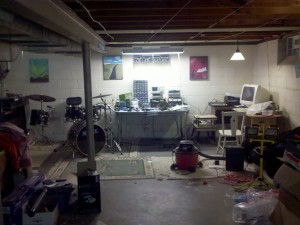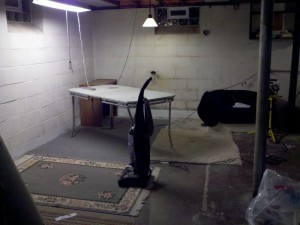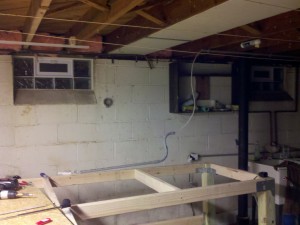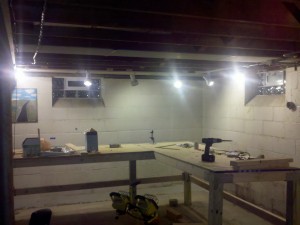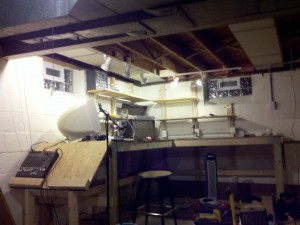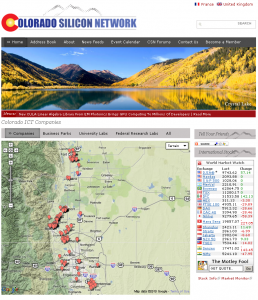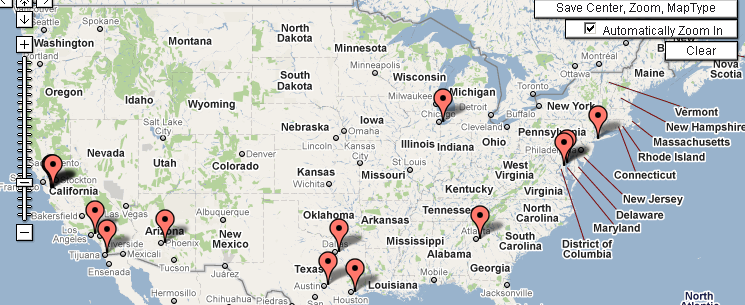This topic was discussed in greater detail in Episode 184 of to The Amp Hour. This article is more about the personal feelings that have accompanied this (ongoing) transition.
Starting Friday, for the first time in my adult life I will be without a job; at least a job as I’ve always defined it. I have been employed as a full time electrical engineer (in various roles, the most relevant being analog ones) for 8 years straight. Prior to that I had been working as a co-op for 10-20 hours a week for another 2 years. All told, I would estimate I have worked roughly 17,000 hours up until this point (in an official capacity). While that would qualify me for the “expert” category if you listened to Malcolm Gladwell and the people he was quoting in that book, it feels like I’m just getting started. It feels like I have a TON to learn and the backlog of things I need to know in the future keeps growing. And you know what? That is one of the best parts of engineering! The real story here is that I have been working for the past 8 months on an electronics education program that is currently running. It’s called Contextual Electronics.
The program launched in January and as of this writing, we are in the middle of the 4th week out of 8 of Session 1A (where we are designing a board). Session 1B (where we build the board) will start in March, a couple weeks after the conclusion of Session 1A. It has been a spectacular group of people who decided to sign up for the program and my decision to leave my full time job is largely based around wanting to serve them better. The 6 months before the program started were dedicated (on nights and weekends) to developing the 8 week curriculum. I want to be able to be forward looking with future curriculum and to better serve them on a day to day basis. But that’s not all I’ll be doing! I’ll also be working on:
- A medical startup — This is a fledgling project with a friend, but one that I am very excited about. It’s in a new field for me as well, resetting the clock on my 10,000+ hours. It is unlikely my “nights and weekends” schedule will change any time soon and I’m ok with that, especially if I get to work on something that excites me like this project does.
- Consulting — I have had a consulting company for about 4 years now, called “Analog Life, LLC” (sounds familiar, eh?). That was normally part time, smaller jobs when I could find them. This will be a larger part of my life now as it will help to support my family more than being a source of income to build out my lab. If you have analog work you need done (or really any electronics projects you’d like to talk about hiring me for), please feel free to contact me.
- Giving talks — This is a new one for me, but I am currently scheduled to do two talks this year: One at the HKN Student Leadership Conference and one at SolidCon. Very different venues, excited about both (and always open to more!).
- Running meetups — I started a local meetup group in Cleveland alongside my friend Martin Lorton. It’s a great opportunity to network and an even better excuse to drink beer and talk about nerdy stuff. It’s called Charged Conversation (shamelessly stolen from a list of possible taglines for The Amp Hour)
- The Amp Hour — Nothing new or different, Dave and I will continue producing podcasts, ranting about what upsets us in the electronics industry and asking people much smarter than us to come talk to us. I’m excited about the potential a looser schedule has for The Amp Hour. Running a show with someone in a timezone 14 hours ahead of you can be restricting…and now that work schedules aren’t a problem (Dave is also self employed), we don’t have that restriction. Just families and the need to sleep at some point.
I also have a running list of projects and other things that have been put off as part of spending my free time on Contextual Electronics. While I don’t think I will have “free” time in any way, shape or form, I do hope some of the following will start to work their way back up the priority list (in no particular order):
- Machining — Remember how I used to write about my new toy, my Taig mill? I started with it about a year ago and then decided I wanted to work on a part time gig that could turn into a full time gig (which it has!). Of particular interest is using my mill to create circuit boards by routing copper clad FR4. This could have lots of benefits for my consulting.
- Run classes in person around the world — This fulfills two interests: Getting out into the world and teaching some of the Contextual Electronics content in person and also doing it in different areas (and seeing the world in the process). This one takes more planning and will be a longer term goal.
- Writing — Sure, everyone says they want to write more, but I do already…it’s just not very visible. I do daily updates for Contextual Electronics and also did so throughout the Beta Process. I would just like to move that same consistency onto this site or others. As much as I already say online, I have a lot more opinions to air!
- Different Podcasts — I stepped away from The Engineering Commons to work on Contextual Electronics (and even went back to talk to them about the program). I am regularly thinking up new podcast topics and would like to explore different formats.
- Developing more products — This is part of developing the curriculum of Contextual Electronics (each session produces an Open Source Hardware project), but I would love to do a start to finish project with the sole goal of commercializing it (without a large corporation backing me).
- Working in different industries — This would be part of consulting, but I would love to branch out a little bit. I have been focused mainly in analog for industrial applications in the past, but also enjoy FPGAs and occasionally have been known to program a microcontroller. I would also like to try different industries, maybe working on a large scale art installation or similar. This is a very nebulous goal, but the main point is I want to continue learning by doing.
- Sleeping/getting healthy — To say my health has declined would be a bit of an understatement. I have definitely gained weight and I can feel my mind getting cloudier from less rest. I think that was another thing that helped edge me towards this decision. I have been keeping the following schedule for the past 8 months:
- Up at 8:00 am
- Get to work at 9:30 am (flexible schedule)
- Short/no lunch
- Leave work at 6:30 pm (on a good day)
- Dinner with family 7:00 pm
- Start working on CE or recording The Amp Hour at 8:00 pm
- Collapse into bed at 2:00 am. Lather, rinse, repeat.
- Playing music — This one has fallen completely off the map and represents true leisure time for me. I used to play in bands and I really miss it. I doubt I’ll ever get back to where I was as a drummer, but I would love to be active musically again. If I can, it will be a sign that I’m moving towards a simpler, more balanced life.
I think one of the things that excites me, is that this inadvertently moves me closer to a post I wrote about 5 years ago called “Engineering The Perfect Day“. Some of my personal goals have definitely changed and music has definitely faded in my priorities, though I still like the feel of that post. It feels like what would be a good life. Only time will tell if it will actually be my future. More than anything, I made good on what I’ve often said about my future when people asked me, “What’s next?” I always respond that my next employer would be me. I don’t know if I’ll be my last employer, but given my increasing restlessness with corporate engineering culture, it seemed like an inevitability. That said, I am sad to leave my current job (which I’ll possibly talk about in the future, as the company is also a good one and I’d like to promote their end goals). I believe I’m leaving under good conditions, though I had asked to stay on part time and was denied for now (more about that in The Amp Hour episode linked at the top). But since I’m leaving and because I want to capture the emotions I’m feeling during this process, I thought I would do a quick list about the things I will and won’t miss.
-
Things I’ll miss
- Co-workers — Always first on my list, I wouldn’t be working there if I didn’t enjoy the people I work with. I’ve learned a lot from this group and learned a bunch from the ones at the job before. For the first time I won’t have any co-workers and coming to terms with that will be odd. I suppose Twitter folk will be my office mates (as well as my slightly less verbal dogs).
- Structure — I was warned about this from consultants in the field now and ones that have come back to the workplace: the lack of structure can be difficult at the beginning. I can see why. It feels like I have an extended vacation coming up to work on whatever I’d like. In reality, I need to purchase food and keep my house in the future.
- Large scale projects that require skills beyond my own — We talked about this a little bit on The Amp Hour a few weeks back. Large companies often work on larger projects and the accompanying budgets. This can present (though doesn’t guarantee) more interesting problems to be solved. It also allows me to lean on skilled co-workers to help me along on new tasks.
- Seeing my work out in the world — Similarly, when the big projects get out into the real world, they can have some impact. Engineers (myself included) take great pride in pointing at a piece of hardware and saying, “I designed/tested/built that”.
- Non-billable time — As I move into consulting, I recognize some of the finer points of how to bill clients and give them The Warm Fuzzy Feeling™ (one of my favorite articles on the internet). This also means I won’t have as much non-billable time that corporate jobs allow for training and researching new topics. Sure, I track my time at my job, but as a salaried person it is more based upon the result of my work than the number of hours on the project.
- Leverage over vendors — As a hardware person, this can be a big one. Having a large company name behind you (and the associated dollar amounts) can really get a vendor’s attention. Now that I’m a shop of one, that will be much more difficult when I need to talk to someone inside a chip company. Hopefully I might be able to use my previous industry connections and my role on The Amp Hour to garner a little extra attention. Every bit helps when you’re in a bind.
- Significant resources (travel, prototypes) — Basically having a budget from my employer and being able to use it to build the stuff necessary in any hardware business.
-
Things I won’t miss
- Corporate culture (from all sides) and hierarchy — Blah blah blah, Chris doesn’t like large corporations. But more than experiencing an Office Space environment, it’s more about the slowness that large companies move. If there is a new technology, it’s less often the case that a large company will be a first adopter. As a small consultant, I can take that risk (either on products I design for sale or with a client’s approval on their project).
- Time restrictions — While non-billable time is nice, it does also mean that I am sitting at the office when I could be out working on a podcast or developing more course material. One of the key parts of having a larger workforce is having flexibility in your workers so they can jump onto new projects as they pop up. This also can mean that workers get a little restless when underutilized.
- Commuting — Working in Cleveland in the winter, this comes into sharper relief. I bought a house near my first company for a short commute and promptly changed jobs (brilliant!). Now my 25 mile commute is a drain on the wallet, my car, my sanity…and most importantly my time. My new commute will be down the basement stairs with a much lower chance of slipping and sliding on the snowy roads.
- Profit restrictions — While a salary is a nice guarantee to a steady amount of money throughout the year, it is also by definition is a limited upside. You’ll never earn more than your salary (plus a possible bonus, also usually limited). As a consultant, and more so as someone starting a business, there is “unlimited” upside, meaning there is a potential for making more money. Sure, there is also risk of making less (or no) money. I think Paul Graham captures this idea well in his article about wealth.
- Job roles — Just like having available labor in their workforce, large companies like defined roles so that it is easier to identify who should take on work as it comes down the pipeline. They also like that there is efficiency in one person becoming a subject matter expert (the theory being they get stuff done quicker). Yes, I like analog electronics. You could even say I love the field. But as mentioned above I want to branch out and try new things. And these days, it feels like engineers need to branch out in order to stay flexible and employable (even as a consultant).
-
Noticeably absent from both lists
- Meetings — These will still happen in my new ventures and may even become more common as I need to get to know new clients and assure them I can do the work. The best case scenario is to minimize the stupidity of all meetings by keeping them short and to the point.
- Benefits — While healthcare was one of my largest concerns going into this decision, it’s really not as big of a deal. I pay either way. You do too! I now will be responsible for paying my corporate premiums as part of any healthcare plan I’m part of of; if I take COBRA, I’ll pay what the company paid for me while I worked there. I’ll still need to pay my personal premiums and put money into an HSA. Yes, it’s a significant cost, but the entire amount paid towards healthcare can be viewed as a lump sum, regardless of who pays it. If my company didn’t pay part of my health insurance now, I would expect them to pay me more per month to match my compensation package to the rest of the market. Now I expect my personal company to pay for my health insurance. The big difference between this year and last is I now have an option if COBRA is overpriced or (in the past) wasn’t guaranteed coverage: I can switch to Obamacare. I like Mr Money Moustache’s take on the new regulations.
- Having a dedicated place to do work — Yes, I also complain about loud co-workers near my cube at work and the fans that blare in the servers near my desk, but my home office will be no different; I’ll have distractions that range from puppies wanting to go outside and play to wives who ask me to do laundry during conference calls (and I’ll listen because she has been so supportive of me!). Unless I get an isolation tank and a waterproof laptop, I likely will have some kind of distraction to complain about.
Really this is all just the beginning of a journey on my own. I’m really appreciative to everyone who listened to my nervous whining about making this jump and still reassured me. I’m very grateful to all the people I’ve worked with in Cleveland over the years and am optimistic that people in other parts of the country are as friendly and helpful. And I’m happy you read all the way to the end of this overly detailed brain dump. Hope to do more of this soon. Thanks to Theen Moy for the cover picture of the caps.


